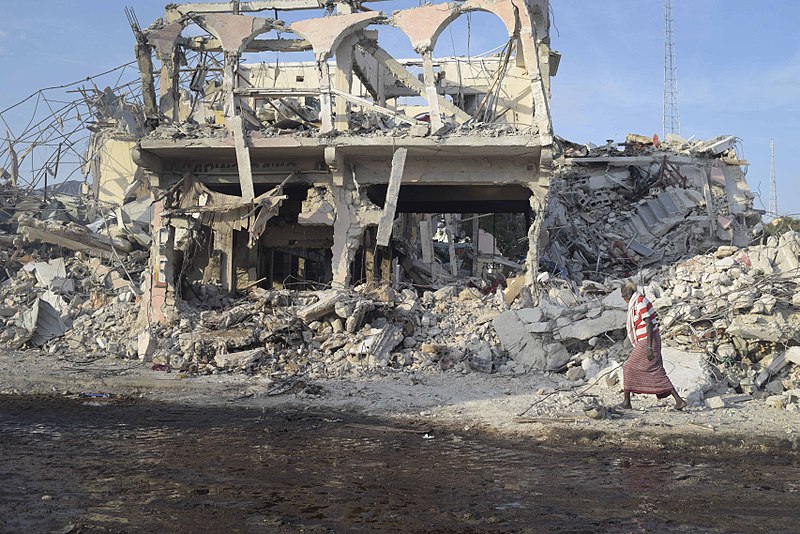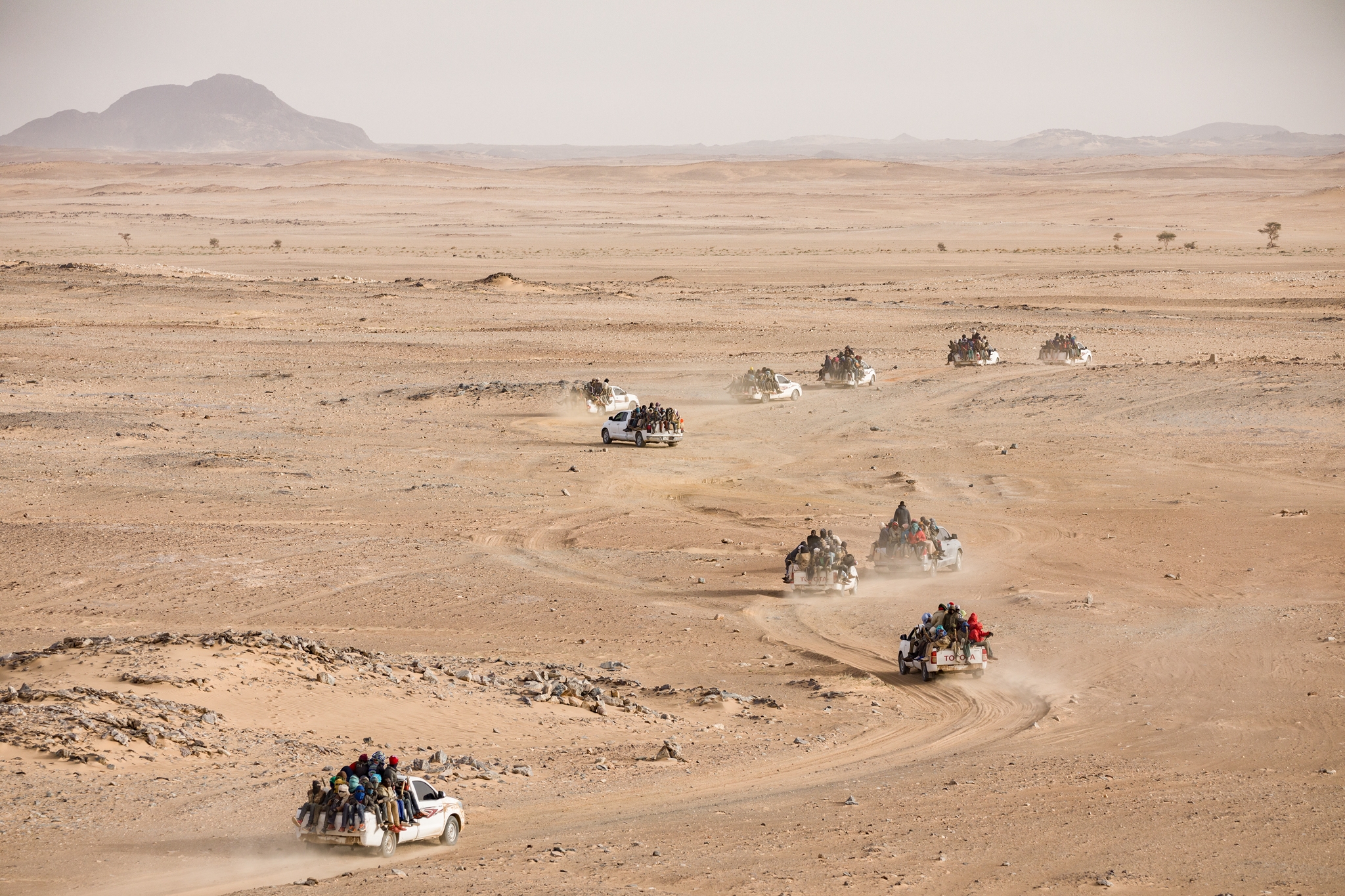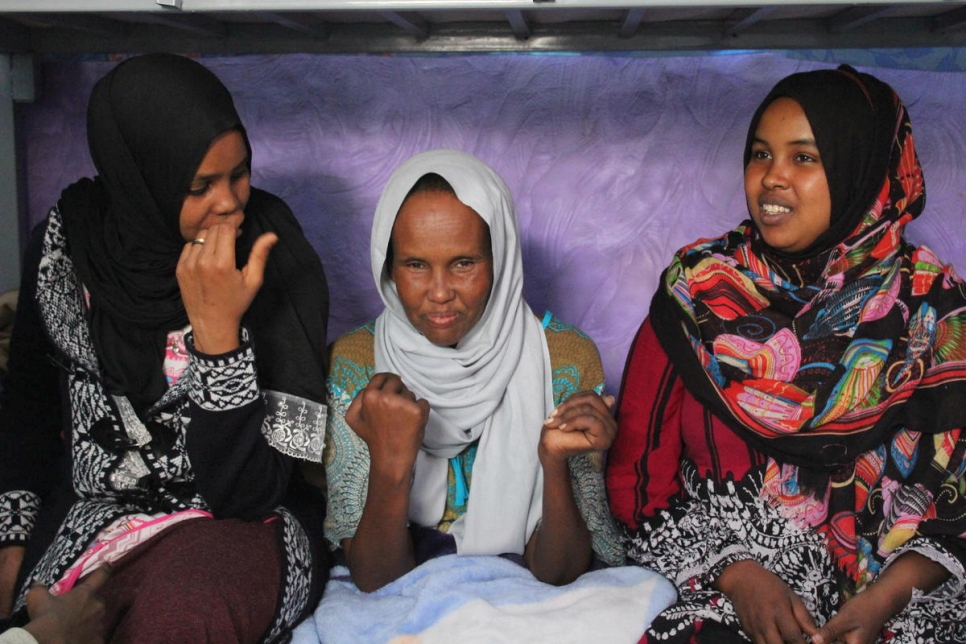A desperate journey
towards the Mediterranean
After 15 months of beatings and abuse in captivity by Libyan traffickers
a Somali mother rejoins her teenage sons in Niamey.
Written by: Louise Donovan (Read the original article)

Amina, Ahmed and Mohamed in Niamey. ©UNHCR
” When I arrived in Libya, I was walking, nobody had to help me … but look at me now,” she says, holding up her badly broken arms in despair, her legs paralyzed.
Somali mother of two Amina* was strong and vigorous before she fell into the hands of Libyan traffickers. After more than a year of relentless beatings and electric shocks, she is now broken and unable to walk.
* Refugees’ names have been changed for protection reasons.
Amina, Ahmed and Mohamed

A building bombed by the militant group al Shabaab in Mogadishu (October 2017, © Wikimedia)
Her ordeal began in 2015 when her home in the capital, Mogadishu, was destroyed by a bomb that killed her husband and brother.
Without access to education and with limited resources, her sons Ahmed and Mohamed, aged 13 and 14 at the time, were in danger of forced recruitment by the armed group Al-Shabab, like so many boys their age.
With few options, the brothers set out in secret with a female cousin in 2016 on a quest for safety that would take them to Yemen, Sudan and then Libya.
Once Amina learned they had left, she set out for war-ravaged Yemen to try to find the boys. She eventually caught up with them five months later in Sudan, but little did they know what lay ahead of them in Libya.
Lybia
After initially negotiating with traffickers, they set off north over the Sahara, with little or no water or food for days, in unyielding heat. Amina grew weak and the traffickers wanted to abandon her in the desert, but her sons refused to leave her.

Migrant convoy in the Sahara desert. Photo: ©NatGeo
When they reached the western Libyan city of Bani Walid, the real horror began. The traffickers demanded US$10,000 for each of the four family members. Amina did not have the means to pay, or family to ask for help.
BANI WALID
“They tortured me so badly. I begged them not to torture my family,” says Amina, who volunteered to take all the abuse to spare her sons and niece.

A migrant rests his hand on a gate inside a detention centre (Libya, 2017). Photo: ©UNICEF/Romenzi
After seven months her body began to shut down from the abuse. She could no longer stand and her hands did not function. So the smugglers began torturing the children.
TO THE COAST
After 15 months in captivity, Amina was on the brink of death. The smugglers did not want to deal with a corpse and realized that they would not get the money they demanded, so they finally let them go.

Migrants at a detention centre in northern Libya. Photo: ©Zuhair Abusrewil
“He knew I would die, and he didn’t want that, so he finally let us go,” recalls Amina. Another niece was also held captive in the same location, so the whole family left together. All five were transported to the coast as part of a larger group. They were among the lucky ones.
ON THE SEA
They were herded on to an inflatable boat bound for Europe. They knew it was overloaded, with more than 100 people, but were powerless and unable to get away. Panic hit several hours later, when the boat began to sink. However a Libyan Coast Guard vessel brought them back to the coast.

Inflatable boat carrying migrants in the Mediterranean. Photo: Wikimedia
At the harbour, UNHCR, the UN Refugee Agency, was waiting for them. Amina was in a critical state and was rushed to hospital. Authorities took the boys and their cousins to a detention centre, where UNHCR informed them they would be flown to Niger.
A NEW LIFE
The move was arranged through UNHCR’s Emergency Evacuation Transit Mechanism (ETM), which was established in November 2017. So far, 1,020 of the most vulnerable refugees – like Amina and her family – have been evacuated to Niger on a temporary basis, while long-term solutions are sought for them, including resettlement.
The boys were first to be offered evacuation. “We were very anxious, from the minute we landed in Niger, we kept asking about our mother – whether she was alive, when she would be joining us,” says Mohamed. To their relief, UNHCR succeeded in flying Amina and her niece to Niger the following week.

Amina sits with her nieces after being evacuated to Niger by UNHCR. (©UNHCR/Louise Donovan)
Amina begins to cry again, but this time from happiness. “Everything changed in a minute. I was so happy. Instead of feeling depressed, I felt blessed,” she recalls.
Written by: Louise Donovan in Niamey, Niger (Read the original article)
DESPERATE JOURNEYS
Persecution, conflicts and human rights violations continue to force people to flee their homes and seek safety in Europe. Many risk their lives and face a treacherous journey.
This movement towards Europe continues to take a devastating toll on human life. Since the beginning of 2014, over 17,000 people are believed to have died or gone missing while crossing the Mediterranean Sea to reach Europe, with reports of many others perishing en route. These risks do not end once in Europe. Those moving onwards irregularly have reported numerous types of abuse, including being pushed back across borders.
More information on the situation in the Mediterranean here
Mediterranean Arrivals by sea or land in 2019*
Total Arrivals:
N/A
-- Last updated:
null
Sea Arrivals:
N/A
-- Last updated:
null
Land Arrivals:
N/A
-- Last updated:
null
Dead and Missing:
N/A
-- Last updated:
null
* Includes Refugees arrived to Italy, Greece, Spain, Cyprus and Malta
Demography of Mediterranean sea arrivals